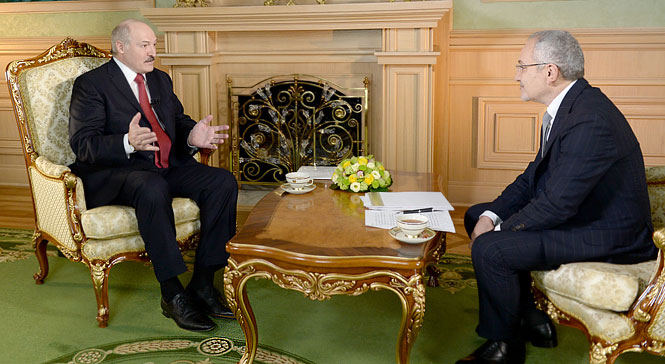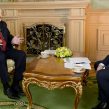
Lukashenka’s Balancing Act on Ukraine
Publication: Eurasia Daily Monitor Volume: 11 Issue: 62
By:

Following President Alyaksandr Lukashenka’s pronouncements about Crimea being effectively part of Russia (see EDM, March 26), Ukraine recalled its ambassador in Minsk for consultations. After Belarus voted against the United Nations General Assembly resolution condemning Russia’s annexation of Crimea, damage control on the part of Minsk assumed even more urgency, if only because of the perceived necessity to retain trade exchange with Ukraine that, in 2013, was worth more than $6 billion.
However, what Lukashenka accomplished during a 2.5-hour-long TV interview broadcast to a Ukrainian audience, as well as subsequently during his 3-hour-long meeting with the acting president of Ukraine, Alexander Turchynov, in Lyashkovichy (Gomel region), far exceeds what any damage control could be presumed to accomplish. According to the “attitude sensor” installed in the Ukrainian TV studio, multiple statements by Lukashenka were enthusiastically approved by the Ukrainian audience, the members of which cringed when Vladimir Putin’s name was mentioned. Also, Lukashenka’s meeting with Turchynov resulted in a friendly worded communique (e.g. “the sides found mutual understanding on all issues of concern to them”) (https://news.tut.by/politics/392889.html).
Lukashenka’s interview was rich in nuances (https://naviny.by/rubrics/politic/2014/03/29/ic_articles_112_185060/). It seems that out of four known facets of political leadership, he at a minimum put three on display—salesmanship, being the agent of a certain reference group, and firefighting (prompt reaction to a crisis). Lukashenka contrived to cast Russia’s actions in Crimea in a way that did not antagonize either Russians or Ukrainians. The perspective that he shared invoked the notion of the West’s deep-seated perfidy. His examples included the allegedly massive provocation by the Western puppet masters who trained the most active Maidan leaders; the potential for the North Atlantic Treaty Organization’s (NATO) deployment in Crimea (unless the latter is snatched by Russia); and the allegedly imminent repressions against Russian speakers in Crimea.
Most importantly, however, from a psychological standpoint, Lukashenka invoked the image of the Ukrainian army’s lethargic response to Russia’s incursion. “Why did you leave? Why did you withdraw your military from there? Why did you not fight if this is your land? Why did you not defend it? I had a nightmare imagining that this could happen to Belarus. Even if our military behaved the way the Ukrainian one did, sitting like mice under a broom at their bases, I would be the first to fight. I would be fighting alone if need be. I am President; I was elected by the people, so I would defend their land. No president in place? There is an acting president and others [in Ukraine]. They had to defend their land. I do not want to be accused of bloodthirstiness and of pushing someone into a war. But how else can one respond if one’s land is taken away? […] Your military acted as deer in the headlights—half of them switched sides and the other half were quietly withdrawn from the Crimea. Crimea was surrendered. Is that not a de facto admission that today’s Crimea is not a territory of Ukraine?” (https://naviny.by/rubrics/politic/2014/03/29/ic_articles_112_185060/).
The most negative potential side effect of the annexation of Crimea, according to Lukashenka, is the incorporation of Ukraine into NATO. After assuring the audience that Putin, nevertheless, has no desire to invade other regions of eastern Ukraine, Lukashenka said he is strongly against the country’s federalization. On this issue, Lukashenka is clearly at loggerheads with Russia, whose position was articulated after the Paris negotiations between Foreign Minister Sergei Lavrov and Secretary of State John Kerry. Lukashenka opined that the key issue that led to public protests in Ukraine was pervasive corruption and generally low-quality governance. He recalled a story shared by Vitaly Klitschko, whose mother could not receive legitimate social benefits after her husband’s death, and once she insisted she was mistreated, she only received half of what she was owed. According to Klitschko, a former Ukrainian boxing champion and leader of the UDAR party, this was how the entire country worked, to which Lukashenka replied: “If learned that my country works that way, I would lose my mind.” There is indeed much anecdotal evidence, half-heartedly confirmed even by the politicized ratings of Transparency International, that corruption in Belarus is lower than in Russia let alone Ukraine.
Lukashenka displayed a sense of humor when asked how he responds when called a dictator. He said that he is not simply a dictator—he is the last dictator [of Europe]; there will not be any more, so journalists should feel lucky having the chance to speak to him. Reportedly, Lukashenka often suggests to Putin that the latter may have outperformed him as a dictator, so they may finally leave him [Lukashenka] in peace. At the end of the interview, Lukashenka playfully suggested that the Ukrainians may still come over to him and ask for help. “And then you will have a dictatorship. Just kidding, for I may scare Ukrainians away.” “They are already scared” mentioned the talk show host. “You have not seen anything, yet,” replied Lukashenka.
Lukashenka’s statement following his meeting with Turchynov was effusively friendly. Even such issues were discussed as the creation of a Black Sea–Baltic Sea transportation corridor, an idea popular in Europe during the 1990s, when it seemed that the geopolitical re-orientation of both Ukraine and Belarus was just round the corner. Belarus’s possible purchase of electricity in Ukraine was also on the agenda, as was the continuation of “brotherly help” that Belarusians routinely render to farms in northern Ukraine during harvest time. Among other things, this practice is a manifestation of Belarusian farms being much better equipped than their Ukrainian and Russian counterparts. Lukashenka specifically mentioned that much of the information Turchynov shared with him was a “revelation” to him, i.e., something that the Belarusian leader did not know before (https://news.tut.by/politics/392889.html).
In summary, faced with a difficult situation, Lukashenka is once again performing his balancing act, the art of which he has perfected. Whereas, from 2007 to 2010, this was mainly about positioning Belarus between Russia and the European Union, today it is about remaining simultaneously in the good graces of both Russia and Ukraine. A national leader much underrated and maligned in the West, Alyaksandr Lukashenka may have made yet another contribution to his legacy.




